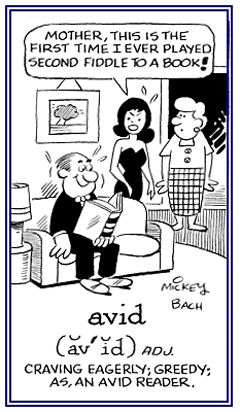avid-
(Latin: to long eagerly for; to wish, to desire; to have a keen interest in something; an intense eagerness to do something)
avid (adjective), more avid, most avid
1. Marked by an active and keen interest and enthusiasm for something: Cherie's mother was an avid football fan.
2. Ardently, or excessively, desirous: Ivan's most avid wish is to travel as often as possible.
3. Having an ardent desire or unbounded craving; greedy: As far back as James can remember, his sister always had an avid desire to read books.

© ALL rights are reserved.

© ALL rights are reserved.

© ALL rights are reserved.
Go to this Word A Day Revisited Index
2. Ardently, or excessively, desirous: Ivan's most avid wish is to travel as often as possible.
3. Having an ardent desire or unbounded craving; greedy: As far back as James can remember, his sister always had an avid desire to read books.



Go to this Word A Day Revisited Index
for a list of additional Mickey Bach illustrations.
1. A protein found in egg white that inactivates the vitamin biotin.
2. A protein found in uncooked egg white that binds to and inactivates biotin. An abundance of avidin in the diet can result in a deficiency of biotin.
3. A protein, found in the white of egg, that combines with and prevents the action of biotin, thus injuring the animal that consumes it in excess by producing biotin deficiency.
4. Etymology: from the mid-20th century. The element avid is used because of its avidity, or affinity, for biotin.
2. A protein found in uncooked egg white that binds to and inactivates biotin. An abundance of avidin in the diet can result in a deficiency of biotin.
3. A protein, found in the white of egg, that combines with and prevents the action of biotin, thus injuring the animal that consumes it in excess by producing biotin deficiency.
4. Etymology: from the mid-20th century. The element avid is used because of its avidity, or affinity, for biotin.
avidious (adjective), more avidious, most avidious
Eager, greedy; an ardent desire or unbounded craving for something: "William has an avidious desire for ice cream; especially, during hot weather."
1. A positive feeling of wanting to push ahead with something.
2. Eagerness; intenseness of desire: "Sam always seems to eat excessively with avidity."
3. Ardent desire, extreme eagerness, greediness.
4. In the field of immunology, the strength of an antigen-antibody binding; a measure of the strength with which an antibody binds to an antigen.
5. Strength of binding, usually of a small molecule with multiple binding sites by a larger one, particularly the binding of a complex antigen by an antibody.
2. Eagerness; intenseness of desire: "Sam always seems to eat excessively with avidity."
3. Ardent desire, extreme eagerness, greediness.
4. In the field of immunology, the strength of an antigen-antibody binding; a measure of the strength with which an antibody binds to an antigen.
5. Strength of binding, usually of a small molecule with multiple binding sites by a larger one, particularly the binding of a complex antigen by an antibody.
avidly (adverb)
1. Descriptive of a desire related to greed, so strong as to be insatiable: "Richard was driven by an avidly strong desire for fame and recognition."
2. Greedily, with intense eagerness: "Rosetta had an eating problem in that she was always avidly eager to consume too much food."
2. Greedily, with intense eagerness: "Rosetta had an eating problem in that she was always avidly eager to consume too much food."
avidness (s) (noun)
1. A positive feeling of wanting to push ahead or to advance with something.
2. Characterized by enthusiasm and vigorous pursuit.
3. Etymology: from the Latin avere, "to crave, to long for" and includes various levels of desire; such as, eagerness, hunger, or outright lust.
2. Characterized by enthusiasm and vigorous pursuit.
3. Etymology: from the Latin avere, "to crave, to long for" and includes various levels of desire; such as, eagerness, hunger, or outright lust.
<img src="/img/left_arrow_sm.gif" alt="" /> <img src="/img/right_arrow_sm.gif" alt="" />
Showing 1 page of 6 main-word entries or main-word-entry groups.
